[Report and Recommendations] The 2nd Global Expert Meeting of The “Rebalancing National Health Systems: Innovation and Sustainability” Series—The Current Status, Challenges, and Opportunities of Health Technology Assessment (HTA) in Japan (October 5, 2017)
date : 4/12/2018
Tags: Future of the Health Care System, Innovation and Sustainability
![[Report and Recommendations] The 2nd Global Expert Meeting of The “Rebalancing National Health Systems: Innovation and Sustainability” Series—The Current Status, Challenges, and Opportunities of Health Technology Assessment (HTA) in Japan (October 5, 2017)](https://hgpi.org/en/wp-content/uploads/sites/2/47a04d18fbba4ebab71e26c2491bb870.png)
******* The Full report published April 4, 2018.
For more information, please refer to the PDF.
The 2nd Global Expert Meeting entitled “Rebalancing National Health Systems: Innovation and Sustainability Series—The Current Status, Challenges, and Opportunities of Health Technology Assessment (HTA) in Japan” was convened by Health and Global Policy Institute (HGPI) on Thursday, October 5, 2017.
In April 2017, the Center for Strategic and International Studies (CSIS) and HGPI jointly convened the very first Global Expert Meeting of the series entitled “Rebalancing National Health Systems: Innovation and Sustainability.” At the first meeting, experts agreed that issues such as those related to containing costs while promoting innovation and ensuring equitable access to quality health care were not unique to Japan, but were wide-ranging challenges being faced around the globe. The meeting’s experts also emphasized the importance of involving the public (patients) in the decision-making process, especially when evaluating the costs and public health benefits of health technology.
Following upon the success of the first meeting in April, the 2nd Global Expert Meeting of the “Rebalancing National Health Systems Innovation and Sustainability Series” was convened, focusing on “The Current Status, Challenges, and Opportunities of Health Technology Assessment (HTA).” The second meeting brought together 20 experts representing the public, private, and academic sectors within Japan and abroad for a discussion held under the Chatham House Rule, which offers anonymity to speakers in order to promote open communication and the sharing of information with the general public.
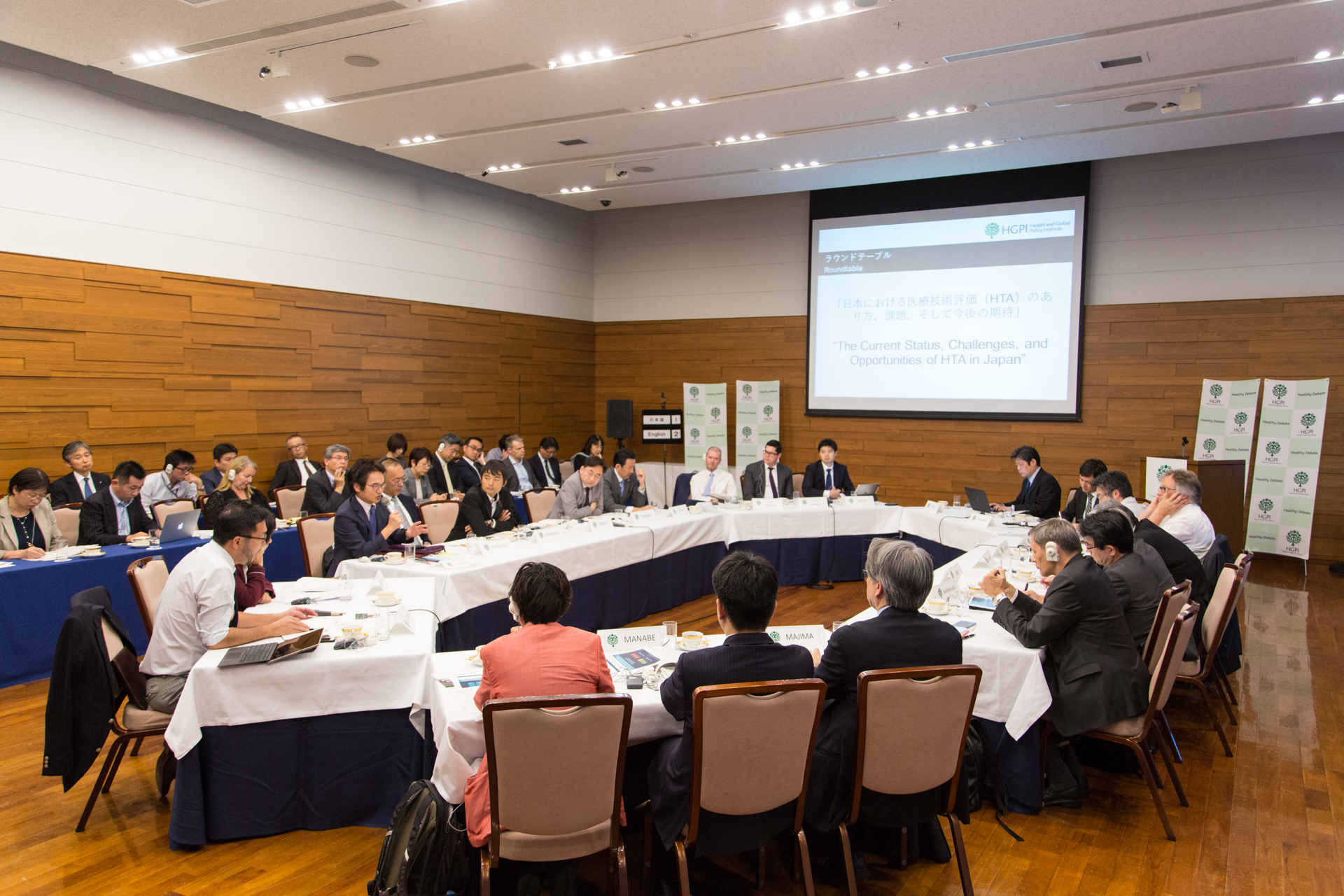
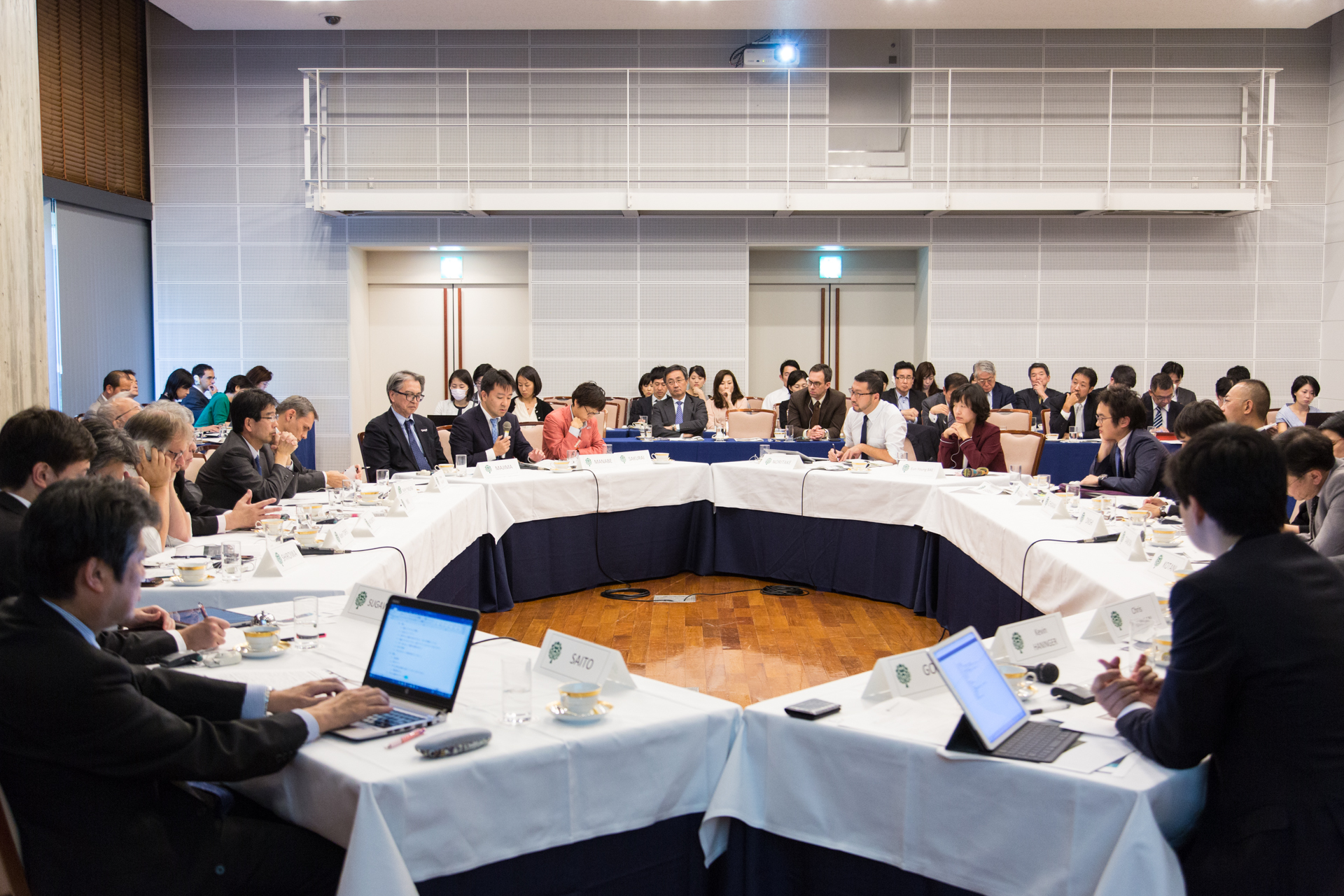
Countries around the world are now grappling with the challenge of how to balance sustainability of national health systems with innovation as medical costs continue to rapidly increase due to epidemiological shifts accompanying the rise of chronic disease prevalence, population ageing, and new developments in medical devices and pharmaceuticals. In Japan as well, it is crucial to maintain a high-level of healthcare services and to sustain the medical insurance system with the limited fiscal resources available. Therefore, the Ministry of Health, Labour and Welfare (MHLW) has proposed the systematic use of HTA by FY2018 as a means of meeting these challenges.
The Central Social Insurance Medical Council (Chuikyo) and others are currently working to compile framework proposals aimed at the realization of that goal. In the 2nd Global Expert Meeting, a variety of domestic and foreign experts, as well as stakeholders discussed the current status of HTA implementation in Japan, in addition to future challenges for HTA and its potential advantages.
Comprehensive Viewpoints to Consider in the Future
Comprehensive Viewpoint 1:
There is a need for stakeholders to acknowledge that HTA is not a tool to contain medical expenses but a tool to evaluate medical technology fairly for both the public and patients.
- HTA discussions tend to revolve around cost containment, including cost-benefit analyses. Stakeholders need to re-acknowledge the viewpoint that HTA is meant to contribute fundamentally to the interests of the public and patients.
Comprehensive Viewpoint 2:
There is a need to consider the introduction of HTA for all medical technology, not just for medical devices and pharmaceuticals.
- In order to realize value-based healthcare for patients, stakeholders should further discuss how to improve the quality of medical technology and medical services as a whole.
- There are cases where HTA results do not lead to results that are in the best interest of patients. Stakeholders should consider evaluation methods that are comprehensive and include clinical practice viewpoints (for example, although on the one hand such innovations as the replacement of injectable drugs with oral drugs are now taking place, this innovation has also created new problems, such as the requirement that patients see multiple doctors in different departments before they can receive a prescription for oral drugs).
Comprehensive Viewpoint 3:
In order to evaluate innovation fairly through the introduction of HTA, it is important that efficiency and productivity within the entire healthcare system be considered alongside the results from HTA.
- While maintaining and enhancing the R&D environment for medical devices and pharmaceuticals with excellent HTA results, stakeholders should also consider effectiveness and efficiency in the entire healthcare system and work to solve problems related to unused drugs and polypharmacy issues by promoting generics, biosimilars, and so on.
■Overview:
Keynote Speech 1: “Rebalancing Innovation & Sustainability—Japan’s Case ”
- Yasuhiro Suzuki (Chief Medical & Global Health Officer, Vice-Minister for Health, Ministry of Health, Labour and Welfare)
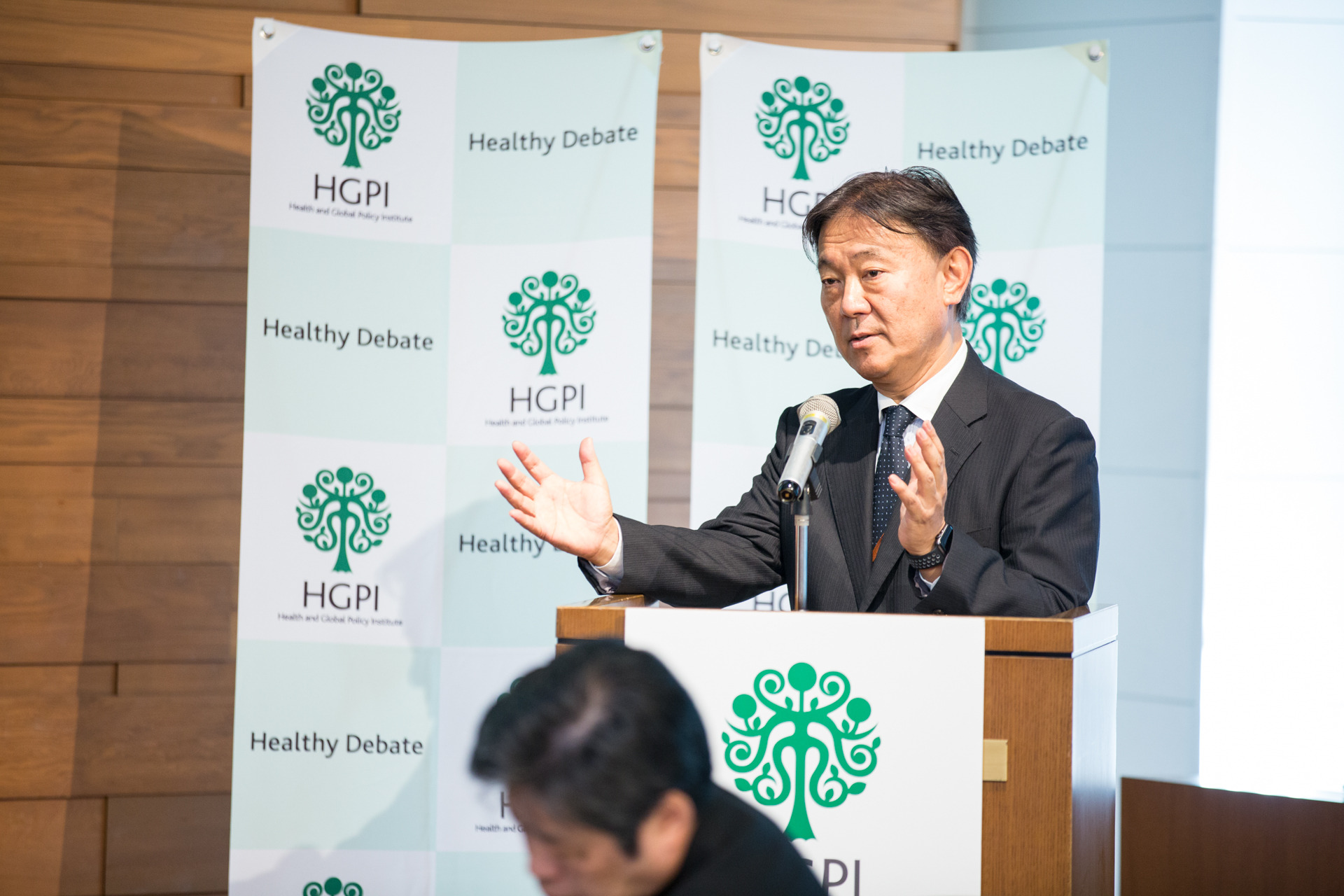
Keynote Speech 2: “Academic History of Health Technology Assessment (HTA) and Its Future Development”
- Shinya Saito (Professor, Graduate School of Health Sciences, Okayama University/ President, ISPOR Japan)
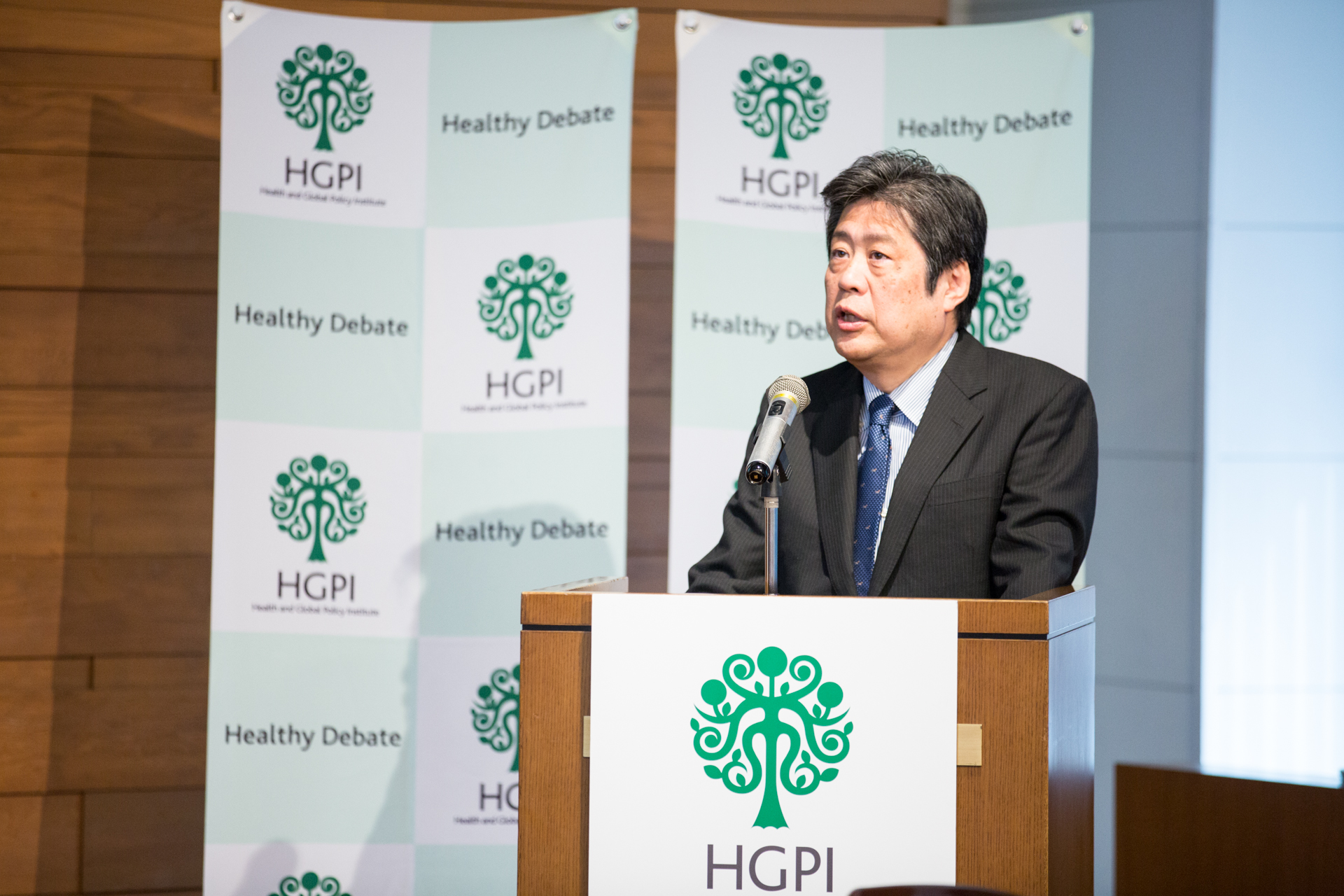
Prof. Saito shared his views on the academic history of health technology assessment (HTA), the usage of HTA, and points to consider regarding the introduction of HTA into Japan.
Round Table “The Current Status, Challenges, and Opportunities of HTA in Japan”
■Participants: (Titles omitted, in no particular order)
-
- Manabu Akazawa (Professor, Meiji Pharmaceutical University, Department of Public Health and Epidemiology)
- Ataru Igarashi (Associate Professor, Graduate School of Pharmaceutical Sciences, The University of Tokyo)
- Mamoru Ichikawa (Principal Program Director, Production Center I Science Programs Division, Program Production Department, Japan Broadcasting Corporation (NHK))
- Eun-Young Bae (Associate Professor, School of Pharmacy, Gyeongsang National University)
- Yoshie Onishi (Director, Japan Operations, Creativ Ceutical)
- Chris Hourigan (President, Janssen Pharmaceutical K.K.)
- Kevin Haninger (Deputy Vice President, International Advocacy, Pharmaceutical Research and Manufacturers of America(PhRMA))
- Koen Torfs (VP Global Reimbursement & Real World Evidence, Janssen Pharmaceutical Companies of Johnson & Johnson)
- Yasushi Goto (Department of Respiratory Medicine, National Cancer Center Hospital)
- Hidehito Kotani (President, Panasonic healthcare Holdings Co., Ltd., President, CEO, CTO, Panasonic Healthcare Co., Ltd.)
- Shinya Saito (Professor, Graduate School of Health Sciences, Okayama University/ President, ISPOR JAPAN)
- Naomi Sakurai (President, Cancer Solutions Co., Ltd. / Patient Representative, Cancer Control Promotion Council)
- Takeru Shiroiwa (Senior Researcher, Department of Health and Welfare Services, National Institute of Public Health)
- Makoto Tamura (Director, Medical Technology Policy Institute American Medical Device and Diagnostic Manufacturers’ Association (AMDD) / Founder and CEO, Healthcare System Planning Institute)
- Hiroshi Nakamura (Professor, Business Environment, Graduate School of Business Administration, Keio University)
- Ryu Niki (Adviser and Professor, Nihon Fukushi University)
- Philippe Fauchet (Vice Chairman, European Federation of Pharmaceutical Industries and Associations (EFPIA) Japan/ Chairman, GlaxoSmithKline K.K.))
- Yoshiyuki Majima (President, Pancreatic Cancer Action Network Japan)
- Junichi Matsumoto (Executive Board Member, Japan Medical Association)
- Kaoru Manabe (Director, Medical Education Division, Ministry of Education, Culture, Sports, Science and Technology (MEXT))
■Moderator:
-
- Ryoji Noritake (President, Health and Global Policy Institute)
- Joji Sugawara (Associate, Health and Global Policy Institute)
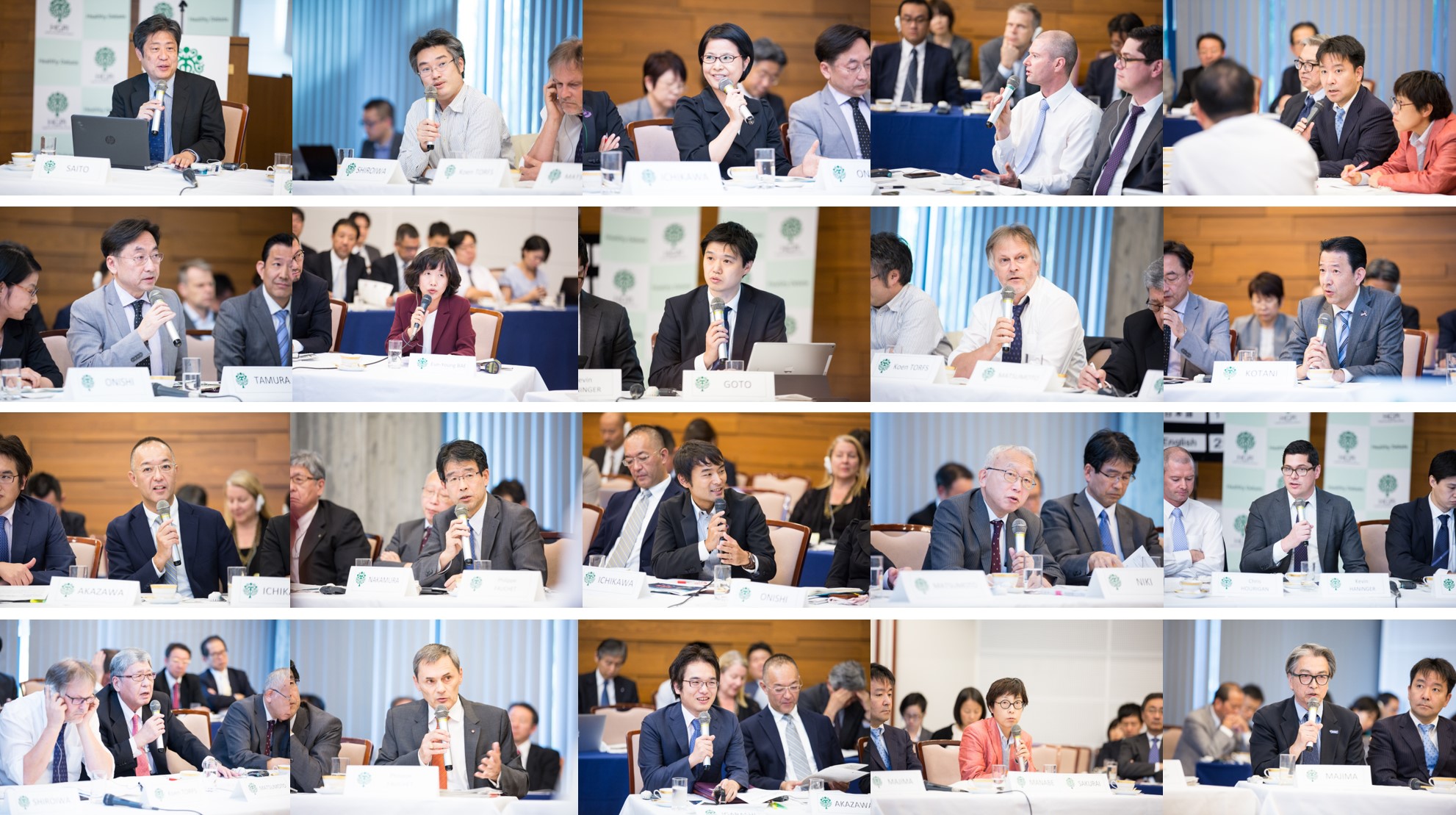
In this roundtable, challenges for carrying out cost-benefit procedures as well as issues requiring further discussion in preparation for Japan’s full-scale introduction of HTA were discussed based on talks held by the Chuikyo up through October 5, 2017.
These 10 points have been extracted and compiled by the organizer of the Global Expert Meeting based on discussions held during the event, and do not necessarily represent the opinions of all event participants, nor do they necessarily reflect current discussions at the time of report publication.
- Discussion Point 1: The Need to Create a System to Collect High-Quality Data
- Discussion Point 2: The Possibility of Analyzing and Evaluating Data Without Determining WTP
- Discussion Point 3: The Need for Scientific and Fair Communication Between Companies and Secondary Analysis Groups
- Discussion Point 4: The Need to Foster Personnel Who Can Work Actively as Analysts in Secondary Analysis Groups
- Discussion Point 5: The Need to Publicize Secondary Analysis Results, and How that Should be Done
- Discussion Point 6: The Need to Secure Fairness and Transparency in Appraisal Methods
- Discussion Point 7: The Need to Take a Different Approaches for Analysis and Appraisal Depending on Whether a Medical Devices or Pharmaceutical is Being Considered
- Discussion Point 8: The Need to Set a Clear Policy on Price Adjustments, Including Whether or Not to Directly Reflect HTA Results in the Pricing System
- Discussion Point 9: The Need to Clarify Public Accountability and How to Accomplish That (Discussions, Evaluation Methods, How to Present Prices, etc.)
- Discussion Point 10: The Need for Discussion on a System that Could Control the Impact of Products that are More Cost-Effective than their Competitors Yet Also More Expensive in Absolute Terms, Dramatically Impacting Health System Finances
(Photographed by: Kazunori Izawa)
Top Research & Recommendations Posts
- [Policy Recommendations] The Path to a Sustainable Healthcare System: Three Key Objectives for Public Deliberation (January 22, 2026)
- [Research Report] Perceptions, Knowledge, Actions and Perspectives of Healthcare Organizations in Japan in Relation to Climate Change and Health: A Cross-Sectional Study (November 13, 2025)
- [Research Report] The 2025 Public Opinion Survey on Healthcare in Japan (March 17, 2025)
- [Policy Recommendations] Reshaping Japan’s Immunization Policy for Life Course Coverage and Vaccine Equity: Challenges and Prospects for an Era of Prevention and Health Promotion (April 25, 2025)
- [Research Report] The 2023 Public Opinion Survey on Satisfaction in Healthcare in Japan and Healthcare Applications of Generative AI (January 11, 2024)
- [Research Report] AMR Policy Update #4: Cancer Care and AMR (Part 1)
- [Policy Recommendations] Developing a National Health and Climate Strategy for Japan (June 26, 2024)
- [Public Comment Submission] “Assessment Report on Climate Change Impacts in Japan (Draft Overview)” (December 24, 2025)
- [Research Report] Survey of Japanese Physicians Regarding Climate Change and Health (December 3, 2023)
- [Research Report] The Public Opinion Survey on Child-Rearing in Modern Japan (Final Report) (March 4, 2022)
Featured Posts
-
2026-01-09
[Registration Open] (Hybrid Format) Dementia Project FY2025 Initiative Concluding Symposium “The Future of Dementia Policy Surrounding Families and Others Who Care for People with Dementia” (March 9, 2026)
![[Registration Open] (Hybrid Format) Dementia Project FY2025 Initiative Concluding Symposium “The Future of Dementia Policy Surrounding Families and Others Who Care for People with Dementia” (March 9, 2026)](https://hgpi.org/en/wp-content/uploads/sites/2/dementia-20260309-top.png)
-
2026-02-05
[Registration Open] (Webinar) The 141st HGPI Seminar “Current Status and Future Prospects of Korea’s Obesity Policy: Voices of People with Lived Experience in Policy Promotion” (March 3, 2026)
![[Registration Open] (Webinar) The 141st HGPI Seminar “Current Status and Future Prospects of Korea’s Obesity Policy: Voices of People with Lived Experience in Policy Promotion” (March 3, 2026)](https://hgpi.org/en/wp-content/uploads/sites/2/hs141-top-1.png)
-
2026-02-06
[Research Report] AMR Policy Update #5: Cancer Care and AMR (Part 2)
![[Research Report] AMR Policy Update #5: Cancer Care and AMR (Part 2)](https://hgpi.org/en/wp-content/uploads/sites/2/HGPI_20260204_AMR-Policy-Update-5.png)




